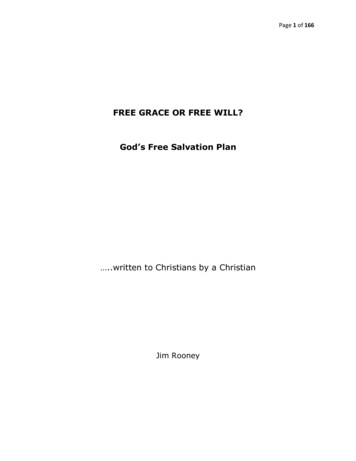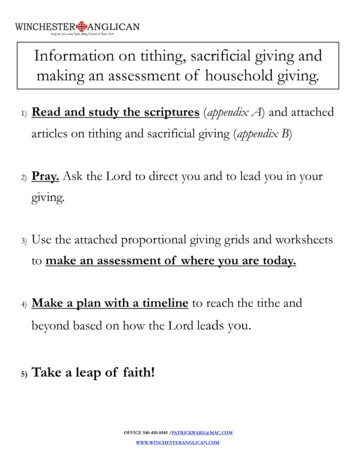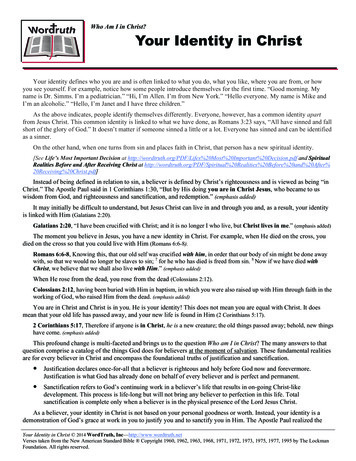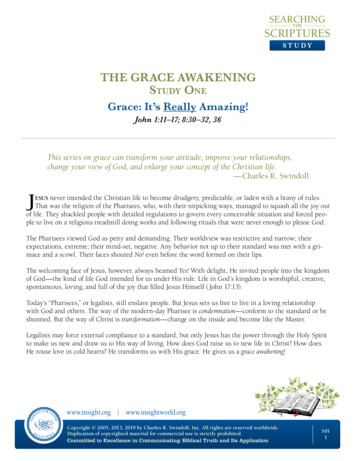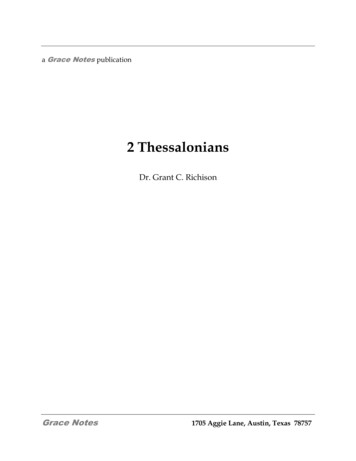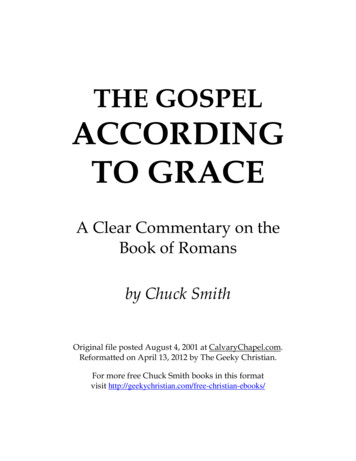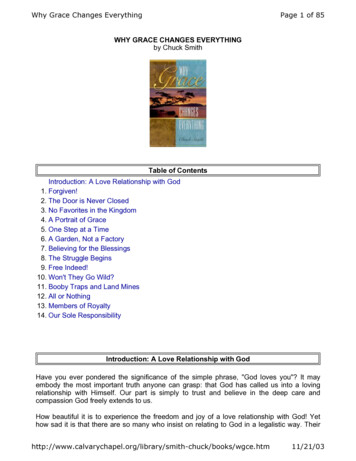
Transcription
The GraceOf GivingA short series on the matter of sacrificial givingin the life of the believerbyPastor David Legge
THE GRACE OF GIVINGPastor David LeggeDavid Legge is a Christian evangelist, preacher and Bibleteacher. He served as Assistant Pastor at PortadownBaptist Church before receiving a call to the pastorate ofthe Iron Hall Assembly in Belfast, Northern Ireland. Heministered as pastor-teacher of the Iron Hall from 19982008, and now resides in Portadown with his wifeBarbara, daughter Lydia and son Noah.Contents1. Its Biblical Basis - 32. Its Biblical Principles Part 1 - 113. Its Biblical Principles Part 2 - 184. The Biblical Challenge Of Giving - 26Appendix: The Conditions And ConfidenceOf God's Provision For Us - 33The audio for this series is available free of charge either on our website(www.preachtheword.com) or by request from info@preachtheword.comAll material by Pastor Legge is copyrighted. However, these materials may be freely copied and distributed unaltered for the purpose of studyand teaching, so long as they are made available to others free of charge, and the copyright is included. This does not include hosting orbroadcasting the materials on another website, however linking to the resources on preachtheword.com is permitted. These materials may not, inany manner, be sold or used to solicit "donations" from others, nor may they be included in anything you intend to copyright, sell, or offer for afee. This copyright is exercised to keep these materials freely available to all.2
THE GRACE OF GIVINGPastor David LeggeThe Grace Of Giving - Chapter 1"Its Biblical Basis"Copyright 2003by Pastor David LeggeAll rights reservedNow let's turn in our Bibles to 2 Corinthians chapter 8, and as I said, we're starting this morning a newseries which will be a short series on 'The Grace of Giving', and this will be the first study 'ItsBiblical Basis'. Now as many of you are aware we have a building project just across the street here,and I think it's important at times like this when there is an exercise needed among God's people, to realiseour responsibilities from scripture. I make no apology for touching and dealing with this subject at such atime, for there could be no better time as this one to remind you of your responsibilities as an assembly. Andif the offerings go up by 1000 pounds per week, I can guarantee you that I'll not be getting that thousandpounds - just in case any of you think that I'm wanting more money!So verse 1 of chapter 8 in 2 Corinthians, Paul says: "Moreover, brethren, we do you to know of the grace ofGod bestowed on the churches of Macedonia". Now just to fill you in, because some of these verses are quitedifficult to read let alone understand - Paul is now exhorting the Corinthians to be liberal in their giving toneeds that there are in the churches, and he is citing the example of the Macedonians, as to how they gaveliberally to other's needs. Verse 2: "How that in a great trial of affliction the abundance of their joy and theirdeep poverty abounded unto the riches of their liberality. For to their power, I bear record, yea, and beyondtheir power they were willing of themselves; Praying us with much intreaty that we would receive the gift,and take upon us the fellowship of the ministering to the saints. And this they did, not as we hoped, but firstgave their own selves to the Lord, and unto us by the will of God. Insomuch that we desired Titus, that as hehad begun, so he would also finish in you the same grace also. Therefore, as ye abound in every thing, infaith, and utterance, and knowledge, and in all diligence, and in your love to us, see that ye abound in thisgrace also. I speak not by commandment, but by occasion of the forwardness of others, and to prove thesincerity of your love. For ye know the grace of our Lord Jesus Christ, that, though he was rich, yet for yoursakes he became poor, that ye through his poverty might be rich" - and we'll finish our reading just there atverse 9.The grace of giving: its Biblical basis. Now, giving is a subject little preached on, and probably not in the topten of requested sermon titles from the pew! Preachers don't deal with it too much, and congregations don'tlike it dealt with too much either. There, I think, are a number of reasons we could cite why Christiansgenerally have hang-ups with regards to talking about money, especially from the pulpit. One hang-up couldbe that they don't want to seem that they're living or talking about things in a way contrary to the warnings ofScripture, which tell us that the love of money is the root of all evil, which tell us that we cannot serve Godand mammon or money or material things - and therefore, because we know it is a sin to worship materialsand finance, we shy away from talking about it at all. We don't want to be misunderstood as beingmercenaries, begging for money, especially when we consider the charismatic movement in our world today- and if any of you have 'the God Channel', I would warn you to be careful what you watch, but many ofthose on the God Channel and such charismatic so-called Christian TV channels are always begging formoney. It amounts to no more than financial fraud of their followers, disgraceful escapades of false prophetswho are making a profit.3
THE GRACE OF GIVINGPastor David LeggeWe are told to beware, Peter tells us of those who 'through covetousness shall with vain words makemerchandise of you, whose judgment now of a long time lingereth not, and their damnation slumbereth not'.It was a charismatic teacher I am told, I wasn't at the meeting, who recently visited the Kings Hall - she's onthe radio quite a lot - and for the first hour or so of her meeting she talked about nothing but money. Whatshe had to sell, the money that they needed to raise in order to rent the building for that particular evening:money, money, money. Because of that many of us shy away from the subject. Neither do we want totransgress the principle that God has told us that His eye is upon the sparrow. God takes care of the littlesparrow in the air, therefore God will take care of us. He clothes the lilies of the field more than Solomon inall his glory, therefore we are afraid that in looking for money and in talking about money, that in some waywe are transgressing this principle that should be the principle of the disciple of Christ of total and utterdependence upon God alone by faith. Not going to others for our need, not looking to the Gentile world forour need, but going to God alone.Certainly we don't want to be mercenary, we don't want to transgress the Scriptures that talk about love ofmoney and the worship of mammon, and we don't want to be misunderstood as getting involved withbegging for money like charismatic financial frauds. We don't want to look as if we're transgressing totaldependence in faith upon God, and we certainly do not want to look as if we are charging for the gospel - andwe must never ever get to the stage where we're asking for people to pay 10 pounds for a ticket to hear thegospel! Yet in all these things, which I have sympathy with, many of them, the Scriptures which no onecould accuse of being mercenary or money-minded, are not afraid to lay financial responsibility squarely andfairly at the feet of God's people. If you read the Scriptures in even a casual reading you will see that that isso, and therefore we ought not to be afraid to talk about it. No one could accuse us from this pulpit ofcontinually talking about money, but for the next four weeks or so we will be talking about such, because wehave a need, and I believe it is scriptural that God's people should be aware of the need and be exercised bythe Spirit of God through the word of God to meet that need - and that need should be met no other way.Dr Adam Clarke once preached on 'Whosoever will let him take of the water of life freely', from Revelation22 and verse 17. At the conclusion he announced an offering, and afterwards a lady asked him: 'How can youreconcile the freeness of the water of life with the collection at the close?'. 'Oh madam', he answered, 'Godgives the water without money, but you must pay for the waterworks, for the pipes, and for the pitcherswhich convey the water'. Isn't that the fact? The water of life is free, and praise God for that, and we mustalways guard that - but there is a need, and a responsibility upon God's people, not only to give to God intheir stewardship with regards to time - and that is so, we could take a series on that alone, energies, the workthat we must do, putting our shoulders to the plough, ploughing God's furrows in the world's field. But ourresponsibility is also upon our resources, and there are financial responsibilities - yes, requirements - of thedisciple of Jesus Christ.Now we're going to look at many verses over the next four weeks or so, but I think the most explicit teachingin the Scriptures is in 2 Corinthians chapter 8 where Paul instructs the Corinthian church regarding giving byciting the beautiful example of the Macedonian church's giving. He begins in verse 1, if you look at it,talking about the grace of God bestowed on the churches of Macedonia. So right away he links this word'grace' with the giving of the Christian - and that's why I've titled this series 'The Grace of Giving'. If youlook further down the verses he uses this phrase five times, in verse 4 he mentions the privilege - in theAuthorised it says: 'Praying us with much intreaty that we would receive the gift'. That word 'gift' is literallythe word for grace 'charis'. He uses the word 'charon' in this verse as well. In verse 6 he uses the phrase 'thisact of grace' - 'You', at the end of it, 'You the same grace', the margin says 'gift' again, but it's the word 'grace'also - the act of grace, 'charon' in Greek. Verse 7: 'Therefore, as ye abound in every thing, in faith, andutterance, and knowledge, and in all diligence, and in your love to us, see that ye abound in this grace also'. Itis the word 'charity', the giving of grace. Verse 9, look at it: 'For ye know the grace of our Lord Jesus','charon' again.4
THE GRACE OF GIVINGPastor David LeggeSo in just these few verses Paul repeats this word 'grace' five times in the context of the believers givingfinancially to each other. So he's telling us giving is a matter of grace from beginning to end, and we'll seethat right throughout the whole Scriptures this morning as we look at its biblical basis - but I want you tounderstand this: giving is not an obligation to the child of God alone. Yes, it is a responsibility, but it ismeant to be a blessing! I wonder do we see it like that?I'm not going to give you too much challenge or exhortation today, I just want to lay a foundation for thenext couple of weeks in our studies. I want you to see that grace is the foundation of giving right throughoutthe whole Bible - now I know we separate Old and New Testaments, and say that the Old is law and the Newis grace, and to a certain extent that is true - but grace giving has had a basis right from the very beginning,even in the Old Testament. I want you to see this, because to understand New Testament grace giving youneed to understand the Old Testament grace giving, and there's a lot of confusion about today as to what Godactually required of His children in the Old Testament, and indeed what He requires of us today. Most peoplethink, 'Oh, the Old Testament Jews had to give a tithe, they had to give a tenth of their earnings - 10 percent and therefore that's what God wants of us today, a tenth, 10 percent'. Maybe that's what you give of yourearnings? Can I just say to you: that is a woeful misconception not only of grace giving, but of giving in theOld Testament, because God did not require a tenth of the ancient Jewish people - that is incorrect.We shall see that this morning, in fact, actually when you study the Old Testament you find that there weremultiple mandatory giving requirements in Israel which came to considerably more than just 10 percent. Letme show you these, because I know people are sceptical about some of the things I come off with at times,and you're well to be such because you've to search the Scriptures to see if these things are so. But let us lookat the first one, you don't have to turn to it, if you wish you can, Numbers 18 - we find there what is calledthe Lord's tithe, the Lord's tithe, or the Levite's tithe. It was in order to support the priestly ministry withinthe tabernacle and later within the temple. Now it's cited for you in Numbers 18, but one reading I want youto look at is Leviticus 27. Turn with me to that, Leviticus 27 verse 30: 'And all the tithe of the land, whetherof the seed of the land, or of the fruit of the tree, is the LORD's', the Lord's tithe, 'it is holy unto the LORD'.So 10 percent of everything that you owned, all the people's produce of their animals, livestock, was given tothe Levites to support them. They had to be fed, they had to be kept, they had to wear clothing, they had tohave a place of at least some comfort to live in. This was supplied by a tithe, a tenth, from the people, whichwas called the Lord's tithe - and there was no option about it, this was not grace giving, this was law. A manwho did not pay it was robbing God. I know there's a whole lot of people that rob the state, but they're notrobbing God - they are sinning against God, but in the Old Testament to not give this tenth of a tax for theLevite was robbing God. Now let me show you this, turn with me to Malachi chapter 3 - I'm going to makeyour fingers work this morning.there's not too many pages turning.do you not know where Malachi is?Malachi chapter 3, at the end of your Old Testament, and this is what God says to His people in verse 8 ofchapter 3: 'Will a man rob God? Yet ye have robbed me. But ye say, Wherein have we robbed thee? In tithesand offerings' - it refers to the Lord's tithe: you're not giving what's mandatory.Now mark this please: for an Old Testament child of God, an Israelite, it was mandatory to give the Lord'stithe - 10 percent, no bones about it. But you see, where many fall down is this: this was not the only tithethat they had to give. In fact, there is an additional initial 10 percent, which is a second tithe which wascalled the 'festival tithe' - you find that in Deuteronomy chapter 12. We'll not turn to it, but this tithe tookeffect, it was said prophetically, when Israel would get into the promised land - they were to celebrate thefact that God had delivered them from Egypt, the type of sin, and brought them into the promised land ofCanaan. They were to join in a celebration which would become an annual celebration, feasting, familytogether, friends and servants would all join together in a feast to celebrate what the Lord had done. That wasthe festival tithe, necessary to pay for those annual religious feasts within the society of the Jews.5
THE GRACE OF GIVINGPastor David LeggeSo the Lord's tithe that we mentioned first was to perpetuate the ministry of the Levite; and this second tithe,the festival tithe, was to build religious celebration and mutual community among the Jewish people. Thetwo tithes together comprised.what? Twenty percent! Twenty percent already, and I say, a mandatorytwenty percent upon God's people - that's quite an economic bite, you would say, isn't it? But there's more you say 'Don't go on any further!' - there is more: there's the poor tithe, Deuteronomy 14 verse 28 and 29. Itcommands a third tithe to be given - now it was given only every three years, so it's not a tenth out of yourwage every year, but a tenth out of your wage every three years, which comes to 3.3 percent per annum. Sothis adds another 3 percent, and it's self-explanatory: it's for the poor, it's a sort of welfare, a social tax inorder to supply for those who can't look after themselves within the society.Now, if you're adding up what does it come to now? 10, 10, 3 - 23 percent per year, every year. Now thoseare the mandatory tithes: one to fund the priesthood, two to fund national feasts, three to aid the poor - andyou might say: 'Enough! I've hardly got anything left for myself!'. Well, there's more - Leviticus 19:9-10,people were also charged to refrain from harvesting the corner of their fields. You got the plough out atharvest time, and you took the - maybe it wasn't the plough, what is it? Whatever they cut down the wheatwith anyway, I'll have to ask my father-in-law! They cut it down and they take it all into harvest, but theyweren't allowed to harvest the corners of the field, they weren't allowed to pick grapes from the vineyardbecause they had to leave the gleaning for the poor. Those corners were left for the poor as well, and inaddition to that mentioned in Leviticus 19 there are other taxes that were to be given from time to time, suchas the tax of the third of a shekel - that came in later in Israel's history, which was to pay for the materials,the provisions for the temple offerings, you can read about that in Nehemiah 10.So added to this Lord's tithe for the priests, added to the festival tithe for the celebrations, the poor tithe for asocial welfare tax for the poor, is the temple tithe - the tithe and tax of a third of a shekel, for the things thatwould go into the temple - and then there's an additional poor tithe of the corners of the fields and the fruit ofthe fields that you're not allowed to pluck from. Why am I telling you all this? Well, here it is, the bottomline was this: God's people were required - now required - to give a bottom line of a minimum of 25 percentof their earnings per year, not a tenth! Several tenths.is that it? No! You say, 'What Bible are you reading?' well, grace giving started in the Old Testament. That is what they were required to give, and then the Lordcomes after this 25 percent and leaves it open, an option for men and women not to give what they have togive but to give from their heart, what they want to give! Grace giving - an offering that is not required.We read in Numbers 18 of the firstfruit offerings, which an Israelite could give to God out of love for Him.In other words, he brought the firstfruit of his crops at the harvest time and he offered it to God, the firstfruitsof his livestock were given to God. The beautiful thing about this was that he did this when he had not yetharvested the rest of the crop for himself. So he was giving to God, ultimately, before he knew whether hehad enough for himself! He was giving the best to God before anybody else. Oh, I wonder do we do that withour earnings? Is God left with the leftovers? Is God left the lamb with the blemish, with the spot; the lambthat is crippled? That's not love giving, grace giving - he gave the best to God, now he didn't have to, but hewanted to, and he was trusting God by faith that God would supply his need whatever the rest of that needwas. It was faith giving, and it was totally involuntary.That wasn't all the grace giving there was in the Old Testament. There was what's called the freewill offering- offerings that God called for when he commanded Moses to build the tabernacle, and you can read aboutthat in Exodus 25 verses 1 and 2. There's nothing specified within it except that it had to be voluntary, and ithad to be from the heart. It wasn't mandatory, it wasn't required, but if you were going to do it you had to doit right. Now turn with me for a moment to Exodus 36, because I want to show you an astounding fact. Nowwe can be awful hard on the Israelites at times, can't we? Oh, we hammer them left, right and centre forwandering around in the wilderness - but here's a lesson that we can take from them even in the midst of6
THE GRACE OF GIVINGPastor David Leggetheir sinful backsliding. Moses asks for these gifts that are not mandatory, that are freewill offerings, and inchapter 36 of Exodus, verse 5 we read: 'And they spake unto Moses, saying, The people bring much morethan enough for the service of the work, which the LORD commanded to make. And Moses gavecommandment, and they caused it to be proclaimed throughout the camp, saying, Let neither man norwoman make any more work for the offering of the sanctuary. So the people were restrained from bringing.For the stuff they had was sufficient for all the work to make it, and too much'!They had given the Lord's tithe, 10 percent; they had then given the festival tithe, another 10 percent; theyhad given a third tithe every three years, which came once a year to 3.3 percent; then many of them wouldhave given grace giving and the firstfruits offering - and now God says: 'Well, I have a tabernacle here tobuild, and I need things for it, and I want you to make things out of the freewill of your heart, through love,voluntarily from your hearts'. The people were so liberal in their giving in the Old Testament that God had totell Moses: 'Tell them to stop! There's too much!'. I've never had that problem, I must say.When a heart overflows with grace giving, even an Old Testament heart - no matter what dispensation youwant to put him in - a substantial amount of that love pours out to God in the giving of the income that wehave financially. Now, we must move on because although grace giving started in the Old Testament, itreally finds its fruition in the New. As we noted, we want to look now at the grace giving in the NewTestament: Paul began his discussion of grace giving by holding this high example of the impoverishedMacedonians abounding, astoundingly in their giving. Verses 1 and 2, these Macedonian were in verse 2 'in agreat trial of affliction'; they were in 'deep poverty'. Now that word 'deep poverty' in verse 2 is the word inthe Greek from which we derive our English word 'bathysphere' - now if you don't know what thebathysphere is, ships are used to probe the 'bathos', which is the very depths of the ocean that no manhumanly speaking can scale. So that is what the bathysphere is - it's the depths of the sea - Paul is sayingthese people were in the depths of poverty, like the fathomless ocean beneath the surface.The Greek scholar Alfred Plummer translates this: 'They give out of their deep-down-to-depth poverty' - nowthey were poor! Some of you maybe count yourself as poor, but if you cast your mind back 50, 60, 70, 80years - we are not poor in comparison, relatively speaking. Look at two-thirds of the world - we are not poor,although we struggle, we all struggle - well, most of us do. But the fact of the matter is that these folks weredown to depth poverty, 'bathos' poverty - they had hardly anything to give whatsoever. One author has said:'Today we fancy ourselves poor if we have to think twice before going out to dinner'. He's an American, hesays: 'The American way today is the credit card, buying things you do not need, with money you do nothave, to impress people you do not like' - but it was not so with the Macedonian Christians.Not only were they excruciatingly poor, but verse 2 tells us that they were in a great trial of affliction - theliteral sense is that they were being squeezed by the difficulties of their life. Maybe you're thinking, 'Don'ttalk to me about giving, I hardly have two pennies to rub together' - neither did these believers, their situationwas almost impossible in the grinding poverty that they experienced in their severe trials. But it was out ofthat circumstance that this incredible grace giving came, and Paul commends them for it. Out of extremetrial, severe poverty, they were overflowing with joy, Paul says, because they abounded unto the riches oftheir liberality. Even in the midst of such awful despair financially, there was grace giving. Do you knowwhat principle that lays down for me? No one is too poor to give - no one. It's astounding - if you think thisis hard to believe, you need to listen to Paul further of his description of them in verses 3 and 4. Look at it:'For to their power, I bear record, yea, and beyond their power they were willing of themselves' - they gavebeyond their means, they gave beyond how they really could, literally 'beyond' means 'contrary to theirability'. They weren't using commonsense here - and I know, and later we'll deal with this, that we have togive as the Lord has prospered us - but let that not be a cloak in any way for us to get out of the fact that theScriptures lay down the fact that in our giving we need to be sacrificial. This is grace giving.7
THE GRACE OF GIVINGPastor David LeggeChrysostom, one of the early Christians, marvelled at these Macedonians, and he said: 'They did the begging,not Paul'. They were saying: 'Come on Paul, have a heart, don't limit us in our giving'. Look at verse 4:'Praying us', they were begging us, 'with much intreaty that we would receive the gift, and take upon us thefellowship of the ministering to the saint'. Now this is astounding: they hadn't really got it to give, but they'rebegging Paul not for money, but begging to give money! There's nothing more I hate than believers beggingfor money - but I haven't seen too many people today begging to give money beyond their means. This is thegrace of giving, it has nothing to do with being well-off, it's not dictated by your ability, it's got to do withyour willingness - your heart, your love for God and for Christ. That's all that can produce such giving - theiramazing giving was simply the result that they had given themselves over to God.If you miss this you miss absolutely everything: it's easy, when you have given everything over to God, togive to others because it's the natural reflex of the soul - when God owns you, the whole of you, He ownseverything that you have. When He lays His finger on something for you to give, you give it! Paul says thereason why they were giving like this was in verse 5: 'they first give their own selves to the Lord, and unto usby the will of God'. Now listen, I know you're saved, but have you ever given your whole self over to God?Have you ever given your pocket over to God? Not like the man baptised, and kept his hand in the air withhis wallet in it, so that it wouldn't go under the water.I'll tell you, pockets are one of the hardest things to baptise these days! They just don't seem to go under thewater! But you see, if you have actually given yourself - as baptism illustrates - the whole of yourself over toGod, there'll be no problem. A young Norwegian named Peter Torgensson (sp?) was 17 years of age and hisheart was so stirred by a challenging missionary message on giving, that he opened his wallet, and he pouredout all his money into the offering bag - and as an afterthought he included a wee scrap of paper on which hewrote 'Og mit liv' (sp?), which translated says 'And my life'. He went later to be a fruitful missionary all hislife in the land of China. But can we say that? 'All my life' - and if all your life is surrendered to the Lord and I'll tell you this, and I'm no statistician, but I reckon that most believers in the West today, their lives arenot entirely surrendered over to the Lord - but if it is, like the Macedonians, you will do the right thingbecause you've done it the right way, you've given your heart to God, and then you've given yourself to yourfellow believers; which in turn results in giving the financial resources that you have. That is where gracegiving must begin.In Romans 12 verse 1, Paul says: 'I beseech you therefore by the mercies of God', the blessings God hasgiven you. This is the grounds for your giving yourself: 'that you present your bodies a living sacrifice,wholly acceptable unto God which is your reasonable service'. In other words, he's saying the reason whyyou should give your whole selves to God is because of all the blessings that God has given to you. That'swhere grace giving begins, because the standard of grace giving is the greatest grace gift that has ever beengiven - and Paul comes to this in his great climax in verse 9. The reason why we ought to give so much ofour whole selves and even our finances, is because we know the grace of our Lord Jesus Christ. This isn't agospel text that we can just pluck out and preach out of context - people say 'You shouldn't preach on givingfrom the pulpit, be careful about giving from the pulpit' - Paul does no greater thing than take the very crossand blood of Christ and enshrine it as an example of how we should be giving financially. I tell you, if he canstamp it with the blood of Christ, we should not apologise in preaching it!He says the very standard that should motivate our giving is the fact that Jesus, who could tread any galaxyHe liked, came from the realms of heaven and took upon Himself the form of a servant and became poor. Idon't have time to begin even, I couldn't even do it, to enter into the wonderful riches of our Lord JesusChrist as He was there, pre-existent before He came into humanity, the Son of God eternally, the Word ofGod with God before the world began - nothing that was created was created without Him. Yet here He isstepping from eternity into time, clothing Himself in flesh, the poverty of that alone! Then going to the crossand becoming sin, He who was perfect and blameless - I'm pathetic even in describing it.8
THE GRACE OF GIVINGPastor David LeggePaul is saying heaven's stewardship programme is this: the cross of Christ, and that's got to be the pattern foryou. Not to give because the preacher begs that much that you'll give a tenner just to get him to shut up; notgiving because you've been promised through the television that you'll be healed, or that you'll get ahundredfold back or a million or whatever, or that your prayers will be answered - here's the reason why weshould give: the grace of our Lord Jesus Christ who was rich, but for our sakes became poor. That is whatproduced the grace giving in their lives: because of Jesus. Do you give in the measure that He was given foryou?Now in conclusion, ca
THE GRACE OF GIVING Pastor David Legge 5 So in just these few verses Paul repeats this word 'grace' five times in the context of the believers giving financially to each other. So he's telling us giving is a matter of

